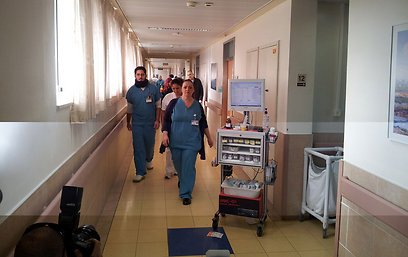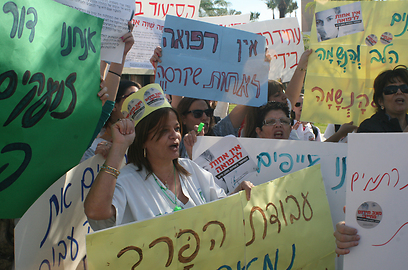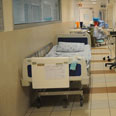National Association of Nurses Chairwoman Ilana Cohen came out against the plan and urged Prime Minister Benjamin Netanyahu to intervene in the crisis. "We will uphold any ruling by the Labor Court but no one can force nurses to work under these conditions," she told Ynet.
Related stories:
- Complaining of exploitation, nurses launch strike
- OECD: Only 4.5 nurses per 1,000 people in Israel
- Health officials warn Netanyahu of budget cuts
Cohen vowed to continue the struggle and held the Finance Ministry accountable for the crisis.
Tuesday's strike will see operating rooms operating on "Shabbat capacity" with smaller teams staying in the intensive care, maternity, premature babies, oncology and dialysis wards.

Nurses walk out of Haifa's Rambam Medical Center (Photo: Ahiya Raved)
"It's not an easy step but we had no choice," Cohen said. "The state is exploiting us because of our devotion. It's a sad day for Israel, for nurses and patients."
Conversely, Moshe Bar Siman-Tov, the Deputy Budgets Commissioner at the Finance Ministry, claimed the strike is an annual occurrence. "Every winter in the past few years there has been a dispute with the nurses. Every time we did what we could: offered more positions, shifts, rent funding and scholarships," he said.

Protest in Soroka Medical Center in Beersheba on Monday (Photo: Sharon Pelesh)
He pointed to two restrictions preventing the Finance Ministry from complying with the nurses' demands: the government's political status and ability to make long-term commitments before an election and the complex economic state.
"The deficit continues to grow and may spiral out of control and we're seeing much lower revenues than expected. We don't know where the global economy is headed," he said. "This affects the amount of money we can distribute and it should be noted that it's the tax-payer's money we are giving out, not private funds."
- Receive Ynetnews updates
directly to your desktop

_a.jpg)















